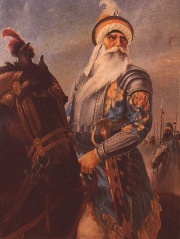Template:AOW107: Difference between revisions
Hari singh (talk | contribs) No edit summary |
Allenwalla (talk | contribs) mNo edit summary |
||
| Line 3: | Line 3: | ||
[[Image:Kapursinghnawaaab.jpg|thumb|right|180px|Nawab Kapur Singh]] | [[Image:Kapursinghnawaaab.jpg|thumb|right|180px|Nawab Kapur Singh]] | ||
'''Nawab Kapur Singh Virk''' (1697-1753) is considered one of the most revered, pivotal and legendary figures in [[Sikh history]], under whose leadership, decisions and courage,the tiny Sikh community traversed through some the darkest periods of its history. | '''Nawab Kapur Singh Virk''' (1697-1753) is considered one of the most revered, pivotal and legendary figures in [[Sikh history]], under whose leadership, decisions and courage, the tiny Sikh community traversed through some of the darkest periods of its history. | ||
The founding father of the [[Sikh Confederacy]] and [[Sikh Empire]], he was also the founder of the [[Dal Khalsa]]. Alongside [[Banda Bahadur]], he laid the foundations of the Sikh Empire. Today, he is regarded by Sikhs to be of equal importance to [[Banda Singh Bahadur]]. | The founding father of the [[Sikh Confederacy]] and [[Sikh Empire]], he was also the founder of the [[Dal Khalsa]]. Alongside [[Banda Bahadur]], he laid the foundations of the Sikh Empire. Today, he is regarded by Sikhs to be of equal importance to [[Banda Singh Bahadur]]. | ||
The period, starting from the massacre in [[Delhi]] of Banda | The period, starting from the massacre (in 1716) in [[Delhi]] of Banda, his son, seven hundred of his devoted army members and thousands of Sikhs taken captive or beheaded along the march to Delhi, was followed by severe action against the [[Sikh]]s, including massacres of young men, women and children. However, every fresh adversity only stimulated the Sikhs' will to survive; this was planned and led by [[Nawab Kapur Singh]]. | ||
Many Sikh scholars have predicted that had it not been for the leadership of Nawab Kapur Singh, the tiny Sikh community of the time would not have survived and would have been massacred. Today, significant number of Sikhs commemorate and celebrate his birthday as a debt of gratitude | Many Sikh scholars have predicted that had it not been for the leadership of Nawab Kapur Singh, the tiny Sikh community of the time would not have survived and would have been massacred. Today, significant number of Sikhs commemorate and celebrate his birthday as a debt of gratitude, with deep respect. | ||
Nawab Kapur Singh was born into a Virk family of Jats in 1697. His native village was Kaloke, now in Sheikhupura district, in [[Punjab]] (Pakistan). Kapur Singh was eleven years old at the time of [[Guru Gobind Singh]]'s death and nineteen at the time of the massacre of [[Banda Bahadur]] and his followers in [[Delhi]]. | Nawab Kapur Singh was born into a Virk family of Jats in 1697. His native village was Kaloke, now in Sheikhupura district, in [[Punjab]] (Pakistan). Kapur Singh was eleven years old at the time of [[Guru Gobind Singh]]'s death and nineteen at the time of the massacre of [[Banda Bahadur]] and his followers in [[Delhi]]. | ||
Later, when he seized the village of Faizullapur, near [[Amritsar]], he renamed it Singhpura and | Later, when he seized the village of Faizullapur, near [[Amritsar]], he renamed it Singhpura and took up residence there. {{aowf|Nawab Kapur Singh}} | ||
Revision as of 22:07, 15 March 2009
Nawab Kapur Singh Virk (1697-1753) is considered one of the most revered, pivotal and legendary figures in Sikh history, under whose leadership, decisions and courage, the tiny Sikh community traversed through some of the darkest periods of its history.
The founding father of the Sikh Confederacy and Sikh Empire, he was also the founder of the Dal Khalsa. Alongside Banda Bahadur, he laid the foundations of the Sikh Empire. Today, he is regarded by Sikhs to be of equal importance to Banda Singh Bahadur.
The period, starting from the massacre (in 1716) in Delhi of Banda, his son, seven hundred of his devoted army members and thousands of Sikhs taken captive or beheaded along the march to Delhi, was followed by severe action against the Sikhs, including massacres of young men, women and children. However, every fresh adversity only stimulated the Sikhs' will to survive; this was planned and led by Nawab Kapur Singh.
Many Sikh scholars have predicted that had it not been for the leadership of Nawab Kapur Singh, the tiny Sikh community of the time would not have survived and would have been massacred. Today, significant number of Sikhs commemorate and celebrate his birthday as a debt of gratitude, with deep respect.
Nawab Kapur Singh was born into a Virk family of Jats in 1697. His native village was Kaloke, now in Sheikhupura district, in Punjab (Pakistan). Kapur Singh was eleven years old at the time of Guru Gobind Singh's death and nineteen at the time of the massacre of Banda Bahadur and his followers in Delhi.
Later, when he seized the village of Faizullapur, near Amritsar, he renamed it Singhpura and took up residence there. .....More

